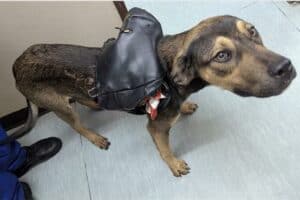Fresh off the plane and ready for action, the hounds have already apprehended their first poaching suspect.

A pack of dogs fresh off the plane from Texas have already apprehended their first poaching suspect, Letaba Herald reports.
On Saturday, the first of 10 new counter-poaching dogs arrived at the Southern African Wildlife College (SAWC) from Texas. During their first live track earlier on Friday, they exceeded expectations and managed to apprehend the suspected poacher.
READ MORE: Alleged poaching kingpin denied bail
These specially trained, free-running pack dogs are joining a highly motivated K9 Unit at the SAWC.
Once settled and accustomed to their new handlers, they will be deployed in counter-poaching operations in the Greater Kruger area.
“We are incredibly excited to be working with these dogs. Our early successes with free-running pack dogs have shown us how effective they are in the field. These dogs are also trained in apprehension work and will actively help rangers stop poachers in their tracks,” said the college CEO, Theresa Sowry.
While on-leash tracker dogs are commonly used by counter-poaching teams, pack dogs that run off-leash are relatively new to the scene, but are already proving their worth. They can track at high speeds over even the most difficult terrain. Recent exercises have seen them cover 30 kilometres in two hours.

SAWC CEO Theresa Sowry greeting one of the hounds that have travelled from Texas to support counter-poaching training and operations. Photo: Southern African Wildlife College
Their top speeds, measured regularly over short distances, are about 40 kilometres an hour. Using aerial support to follow the dogs allows the rangers to catch up on valuable time in the field.
The new dogs are a cross between black, tan and redbone breeds.
When asked via social media why the dogs were sourced from Texas, the SAWC responded: “They come from a lineage which have been bred to track humans for law enforcement purposes. [They] have been specially bred over decades in the USA to follow a scent laid by humans.”
The college will begin working with these dogs to be able to deploy them to hold poachers at bay while waiting for rangers to arrive.

Free-running pack dogs are proving to be a successful addition to anti-poaching teams in South Africa. Photo supplied.
As the demand for well-trained dogs and handlers grows, there is potential for the college, as an SADC training institute, to play a major role in replicating the K9 Unit’s early successes in protected areas throughout Africa.
“When I found out what is really going on in southern Africa – how serious and destructive the poaching crisis is – I thought, if I can do something to help, I’m going to do it,” said Texas houndsman Joe Braman, who has 35 years of experience working with dogs to positively impact wildlife conservation efforts.
The Ivan Carter Wildlife Conservation Alliance, and its donors, including the Nelson Pruett Foundation, have provided valuable support for the transport and ongoing expenses of this valuable pack of hounds in the USA. Other South African-based donors have generously pledged their support include Global Paws, who assisted with the applications for the dogs’ import permit authorisations and customs preclearance.

Dog Master, Johan van Straaten, working with a dog and a handler in a training exercise. Photo supplied.
In addition, Global Paws paid the dogs handling fees, and were present for their checks on arrival by the state veterinarian. South African Airways Cargo – introduced to the project via WWF South Africa – flew the dogs to South Africa.
Once all the dogs have arrived – a maximum of five can be transported per flight given their size – they will travel to the college’s state of the art K9 Unit, which was established in 2015 with funding from the WWF Nedbank Green Trust.
Further assistance generously provided by the International Fund for Animal Welfare (IFAW) helps support the unit’s increasing running costs.

One of the new arrivals. Photo: Southern African Wildlife College
“Adding tracker dogs to the field ranger teams has really changed the game, but as their successes increase, so to do the risks they face. This is why the College needs ongoing support, most immediately for security upgrades for these valuable, hard working dogs,” noted Sowry.
“They’re real conservation heroes that compliment the work being done by field rangers, through aerial support and within communities, as part of our four-tiered approach to counter poaching. We can’t wait to see what these new additions from the USA bring to the team.”
For more news your way, download The Citizen’s app for iOS and Android






